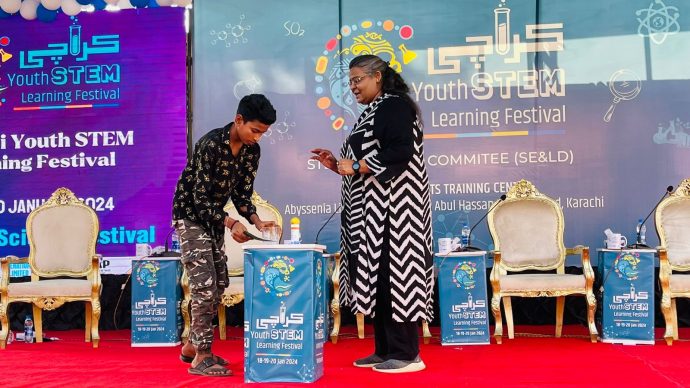
The STEM learning festival in Sindh examines how natural disasters affect education; Demands the creation of a Sindh Education Policy
The STEM learning festival is being celebrated in Karachi. During the second day of the three-day Karachi Youth STEM Learning Festival, speakers from various sessions advocated for the creation of a better and effective Sindh Education Policy.
Moderator Jawad Mirani noted during the discussion on investments in STEM education, quality enhancement, and education in emergencies that despite being one of the most significant global concerns, neither governments nor the general public gave this topic much thought. “We need to pay serious attention to this issue,” he stated.
According to panelist Pirbhu Satyani, kids were scared to sit in dilapidated schools that had been ruined by floods.
Partab Rai Shivani, an educator, said, “we lack a comprehensive plan, relying on appeals rather than having a structured policy, particularly in the absence of a Sindh Education Policy post the 18th Amendment, which has made education a provincial matter.”
There are 60,000 instructors in the country, yet many schools are understaffed. Climate disasters, according to Sadiqa Salahudin, have created serious obstacles to the continuation of education, with the floods of 2010 and 2022 having a particularly large impact. They are dedicated to boosting interest in education in these circumstances, despite these obstacles.
Experts on the panel on “Alternative pathways for Out-of-School Children: Challenge, Opportunities, and Way forwards” talked about the necessity of implementing digital learning and fostering digital literacy in schools. Schools should make libraries and information more accessible. Children can learn a great deal through visual aids like videos. There are digital strategies that can be used to increase children’s exposure.
The Education Department hosted a Non-Formal Education Forum where talks were held and post-primary skill development was the main topic. Adolescent males and girls have a variety of options for pursuing their aspirations. They are provided with choices and chances to enter the field and make money. They continued, “For better results, we collaborate with organizations working on NFE models.”
During the panel discussion on “Preparing Super Women: Gender Gap in STEM Education,” transgender rights activist Shahzadi Rai emphasized the value of inclusivity and the necessity of discussing the transgender community in relation to the gender gap in STEM.
Individuals from many backgrounds attended the occasion; two days’ worth of attendance records show that 15,000 pupils from various Karachi schools took part in the festival.

Content writer, educationist, teacher, researcher, social media manager, and a SEO manager from lahore. She has been working as a freelance academic and non-academic writer for more than 10 years now. She has a passion to learn new things and has a knack for writing and she combines both things to produce write ups she pours her heart out in.

